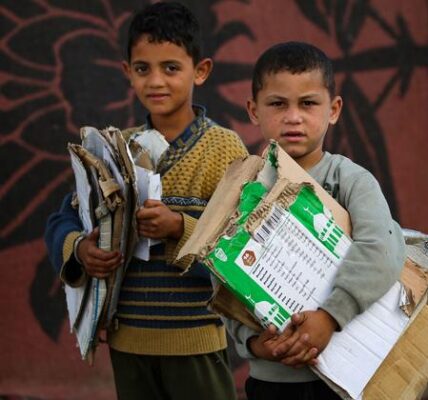The United Nations humanitarian agencies have issued a warning about the ongoing suffering of Gazans due to displacement.

Rephrasing the text:
In a tweet on X, UN Secretary-General António Guterres expressed similar concerns and cautioned about the increasing danger of death faced by Gazans, along with the additional risk of disease due to the collapsing healthcare system.
According to Mr. Guterres, only 16 out of 36 hospitals are currently operating at least partially.
In a recent statement on a social media platform, Martin Griffiths, the UN’s emergency relief coordinator, stated that the violence in Gaza has not stopped since October 7th. This was when Israel began bombing in response to attacks by Hamas in Israel, resulting in 1,200 deaths and around 250 people being held hostage.
According to Mr. Griffiths, data from the Gaza health authority states that over 25,000 individuals have been killed, with an average of two mothers being killed every hour. The situation in hospitals remains dire as they are overcrowded and under attack, and homes have been destroyed, leaving people without safe places to seek refuge.
Survival instinct
According to the UN agency for Palestinian refugees (UNRWA), there has been a significant increase in people being forced to leave the Khan Younis area due to heightened violence this week. These newly arrived individuals have set up large plastic tents along the border between Rafah in southern Gaza and Egypt.
According to the most recent update from the UN’s aid coordination office, OCHA, there has been a significant increase in fighting in the Khan Younis region on Monday resulting in numerous fatalities.
The overall condition is rapidly worsening, according to UNRWA representative Adnan Abu Hasna. He highlighted that with a population of 1.3 million, Rafah city is struggling to handle the large number of people entering. This was observed firsthand by top officials Sigrid Kaag, the UN Senior Humanitarian and Reconstruction Coordinator for Gaza, and Jamie McGoldrick, interim Humanitarian Coordinator for the Occupied Palestinian Territory during their visit on Tuesday.
Meningitis threat
The increase in cases of meningitis and hepatitis C, as well as intestinal and skin diseases, is causing concern for UNRWA’s Mr. Hasna. He warned that this could overwhelm health services and called for more humanitarian aid to be provided to the Gaza Strip, where everyone is at risk regardless of location.
We believe that relocating more Palestinian residents to Rafah city is exacerbating the already volatile situation, as there is no truly safe place for them.
Education at a standstill
On Wednesday, the United Nations agency tweeted that on the International Day of Education, all of its schools in Gaza are currently closed and housing over 1.2 million displaced Palestinians.
According to reports, over 340 individuals who were seeking refuge in UNRWA shelters have lost their lives and more than 1,100 have been injured.
UNWRA reported that 75% of school buildings in the Strip have been damaged, as well as several institutions of higher education. The organization emphasized that these attacks on educational facilities and UN premises are a violation of international humanitarian law.
According to UNRWA, over 625,000 students and 22,564 teachers in the enclave have been unable to receive education or access a safe environment for more than three months since the beginning of the war.
As the firing of rockets from Gaza into Israel persists, the UN agency acknowledged that “thousands of students and education staff” were among the casualties.
According to UNRWA, access to lessons in the West Bank has been disrupted due to increasing violence. The organization reiterated its plea for the conflict to come to an end.
Source: news.un.org



